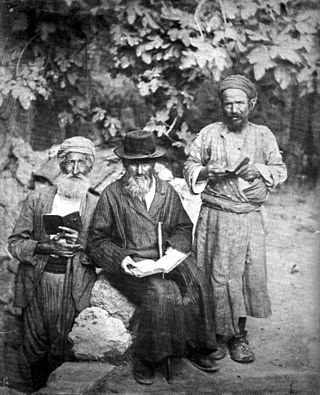Related Research Articles

Jewish philosophy includes all philosophy carried out by Jews, or in relation to the religion of Judaism. Until modern Haskalah and Jewish emancipation, Jewish philosophy was preoccupied with attempts to reconcile coherent new ideas into the tradition of Rabbinic Judaism, thus organizing emergent ideas that are not necessarily Jewish into a uniquely Jewish scholastic framework and world-view. With their acceptance into modern society, Jews with secular educations embraced or developed entirely new philosophies to meet the demands of the world in which they now found themselves.
Tannaim were the rabbinic sages whose views are recorded in the Mishnah, from approximately 10–220 CE. The period of the Tannaim, also referred to as the Mishnaic period, lasted about 210 years. It came after the period of the Zugot ("pairs"), and was immediately followed by the period of the Amoraim ("interpreters").

The Tosafot,Tosafos or Tosfot are medieval commentaries on the Talmud. They take the form of critical and explanatory glosses, printed, in almost all Talmud editions, on the outer margin and opposite Rashi's notes.
Horowitz is a Levitical Ashkenazi surname deriving from the Horowitz family, though it can also be a non-Jewish surname as well. The name is derived from the town of Hořovice, Bohemia. Other variants of the name include Harowitz, Harrwitz, Harwitz, Horovitz, Horvitz, Horwicz, Horwitz, Hourwitz, Hurewicz, Hurwicz, Hurwitz, Gerovich, Gurovich, Gurevich, Gurvich, Gourevitch, Orowitz and Urwitz.
Judah ben Samuel of Regensburg, also called Yehuda HeHasid or 'Judah the Pious' in Hebrew, was a leader of the Chassidei Ashkenaz, a movement of Jewish mysticism in Germany considered different from the 18th-century Hasidic movement founded by the Baal Shem Tov.
Rishonim were the leading rabbis and poskim who lived approximately during the 11th to 15th centuries, in the era before the writing of the Shulchan Aruch and following the Geonim. Rabbinic scholars subsequent to the Shulchan Aruch are generally known as acharonim.
Elijah Mizrachi was a Talmudist and posek, an authority on Halakha, and a mathematician. He is best known for his Sefer ha-Mizrachi, a supercommentary on Rashi's commentary on the Torah. He is also known as Re'em, the Hebrew acronym for "Rabbi Elijah Mizrachi", coinciding with the Biblical name of an animal, sometimes translated as "unicorn".
Ehrenreich is a surname that was adopted by diverse families in Germany when surnames were legally required. Most people with this name are of Jewish heritage, but there are also people of this name with Catholic heritage. Notable people with the surname include:
Abulafia or Abolafia is a Sephardi Jewish surname whose etymological origin is in the Arabic language. The family name, like many other Hispanic-origin Sephardic Jewish surnames, originated in Spain among Spanish Jews (Sephardim), during the time when it was ruled as Al-Andalus by Arabic-speaking Moors.
Halevi may refer to:
Moses ben Isaac ha-Levi Minz was a German rabbi, a disciple of R. Yaakov Weil and contemporary of Israel Isserlein, whom he frequently consulted. He was successively rabbi at Mainz, Landau, Bamberg, and Posen. He is one of the first known Jewish Scholars to have officiated as Rav of a city in Poland.

Judah ben Eliezer ha-Levi Minz, also known as Mahari Minz, was the most prominent Italian rabbi of his time. As his surname suggests, he immigrated around 1462 from Mainz to Italy. He officiated as rabbi of Padua for forty-seven years, during which time he had a great number of pupils, among whom were his son Abraham Minz, and the latter's son-in-law Meir Katzenellenbogen. In a dispute he had with Elia del Medigo, he was supported by Elijah Mizrachi.
Meir ben Isaac Katzenellenbogen was a German rabbi born in Katzenelnbogen.
Abraham ben Judah ha-Levi Minz was an Italian rabbi who flourished at Padua in the first half of the 16th century. Minz studied chiefly under his father, Judah Minz, whom he succeeded as rabbi and head of the yeshiva of Padua. According to Gedaliah ibn Yahya ben Joseph, it was with Abraham Minz that Jacob Pollak had the quarrel which ended in their excommunicating each other; according to most other authorities, the quarrel was with Judah Minz. Ibn Yahya further says that the Italian rabbis believe that Polak and Abraham Minz died on the same day. Minz was the author of a number of decisions that were printed with those of R. Lewa of Ferrara. He was the author also of Seder Gittin ve-Chalitzah, a treatise on divorce and Chalitzah, printed with the responsa of his father and of his son-in-law Meir Katzenellenbogen.
Mahari is a Hebrew acronym, referring to any one of a number of rabbis:

A meshulach, also known as a shaliach or SHaDaR, was an emissary sent to the Diaspora to raise funds (ḥalukka) for the Jewish communities of the Land of Israel. In recent times, the term has come to mean any charity collector for a Jewish organization.
Cantarini is an Italian surname. Notable people with the surname include:
Ben Asher is a Jewish surname meaning "son of Asher".
Ben-Israel or Ben-Yisrael is a Hebrew surname, literally meaning "son of Israel". Ben Israel is a Hebrew patronymic with the same meaning.
References
- ↑ "Minz Has A Story To Tell, And He Wants Everyone To Hear it". The Native. 2017-07-29. Retrieved 2020-01-10.